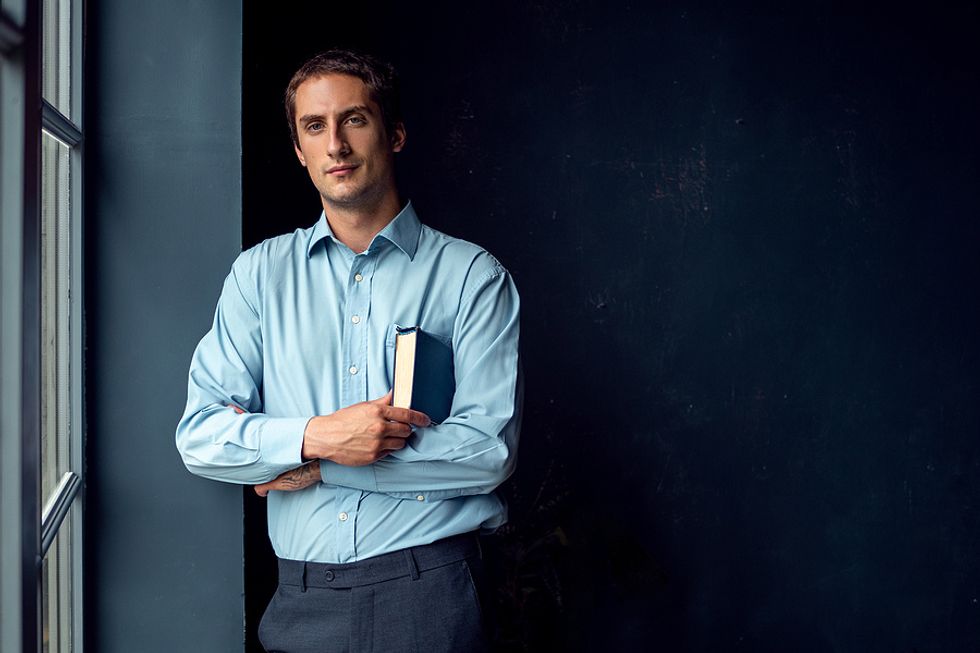
It's impossible to ignore the positive impact reading can have on your career. There have been countless studies detailing the benefits of reading, and executives would be mistaken not to make time to read every day.
So, what types of books should executives read to grow their careers? Here are some book recommendations from fellow executives.
Steve Barriault, Global Technology Sales Leader

Bigstock
Given that most of us are so much looking forward to the days when borders open up and we hit the road again, I will be a history buff on that one and recommend The Art Of War by Sun Zi (Sun Tzu using the old transliteration).
For those of you who do not know, that book was written in the 5th century. That's BC for you. And it is still a "best-seller" of sorts in East Asia for the wisdom it contains.
I hear many of you protest: business is not war! No—but it is certainly a competition, and many lessons provided in the book also apply to competitive situations.
Here is the most basic of the lessons it contains: "know yourself, know your enemy, 100 battles, 100 victories (知己知彼、百战百胜)."
Think about it. As an executive, planning without knowing the competitive landscape will end with less-than-impressive results. As Sun Zi puts it, for every single victory you will notch, you will suffer a defeat. Ouch!
Of course, not knowing your own organization's strengths and weaknesses—or, worse, having delusions about them—is a sure way to defeat outright, something Sun Zi makes explicit.
The book discusses many topics related to cost optimization, a definition of what strength is, and the importance of terrain and momentum.
The lessons it contains on leadership and management are of particular relevance to our trade. For instance, Sun Zi generally takes a dim view of over-confidence, and the most efficient commander is the one that will go out of his (or her) way to keep their strengths secret.
In American parlance, instead of boasting, let your bat do the talking for you.
Beyond the book's intrinsic value as a mind teaser, it is also a cultural primer of sorts in East Asian culture.
I read the book in its "original" Chinese version (with the text "translated" into modern Chinese, my language capabilities not being "backward compatible" with the 5th century BC!). Time and again, it certainly proved to be a great ice breaker during my multiple travels to the region.
My copy contained stories from The Romance of the Three Kingdoms in comments to illustrate the different lessons, which I would also add to my reading recommendation. That book narrates a tumultuous portion of Chinese history in a romanticized form.
Not only do you get prime examples of what (not) to do, you also get to know well-known characters and their unique personalities. Imagine the surprise of your Chinese hosts when you quote the intelligence of a Sima Yi, the energy of a Zhang Fei, or the rashness of a Lü Bu in a casual conversation.
And if you learn the way Koreans or Japanese pronounce their names natively, you may be surprised to find your interlocutor positively impressed by your knowledge as well.
Steve Barriault is a global technology sales executive with 18+ years of experience in business development on three continents. He is currently serving in a 3,000 employee-strong company providing embedded software testing solutions in multiple industries such as automotive, avionics, industrial systems, telecom, and others. Multilingual, he holds advanced degrees in business, science, and computer science.
Amy Hinderer, Business Management & Operations Executive

Bigstock
When asked to share my #1 book recommendation for executives, I quickly said it is Failing Forward by John C. Maxwell. This was a title recommended to me several years ago and I am excited to pay it forward. As the title implies, it is about how we can use failure as an avenue to success with gripping examples of individuals who initially failed, yet through their never-ending perseverance, went on to achieve significant success. Having that power of persistence, that never giving up attitude, that is the difference between success and failure.
Maxwell does a great job educating readers on how to embrace failures and how to use these failures to move forward with greater success. A key takeaway that I enjoyed learning about was how to redefine failure. We are humans and as humans, we will make mistakes. We must not define our mistakes as failures. Take the viewpoint that mistakes are simply the price we pay to continue our growth and forward movement. The author quotes Thomas Edison, "Many of life's failures are people who did not realize how close they were to success when they gave up."
There is much more that I could share from this book. I hope I have provided you with just enough insight that whets your appetite, enough so that you will want to grab your favorite drink and sit down by a warm fire for a great read. Let me know what books you recommend. I'd like to add them to my reading list.
Bonus recommendation: I am currently reading Limitless by Jim Kwik. It has quickly become one of my top 10.
Amy Hinderer is a business management & operations executive with 18+ years of experience in global enterprise and start-up businesses. She has managed teams ranging in size from 10 up through ~35K supporting revenues between $2M - $9B.
Chris Rankin, Marketing Leader

Bigstock
It's all thumbs up and virtual high five emojis! The CEO just green-lit a new digital effort sure to turn around the numbers in this crazy COVID-19 countdown to 2021. It's a huge win for the new guy on the leadership team, and you are 100% behind the direction. Heck, you even helped the guy craft his approach because you had all the data from when you pitched the same idea a few months ago, and it was dismissed with a hard "no." But as everyone celebrates, you can't help but wonder, "What made the difference between success and failure for the same idea?"
Before you start questioning yourself or your value (see my thoughts about self doubt and imposter syndrome), the fact that you are asking the question alone is spot-on, and I highly recommend Warren Berger's book A More Beautiful Question for anyone looking for answers on how to create a business culture capable of weathering disruption and unprecedented change.
There's no roadmap for new directions.
Warren writes, "One of the primary drivers of questioning is an awareness of what we don't know." New ideas contain a certain amount of risk, and your first pitch was actually asking the leadership team to consider that they had a blind spot (not something everyone is willing to own on the spot). Warren says, "Questioning is about exposing vulnerability—and being okay with vulnerability as a cultural currency." True leadership is the courage to bring forward your vulnerabilities, to lay the groundwork for future conversations. The fact that the idea was embraced the second time it came up is directly tied to how well the first pitch introduced the question. Need more? Check out Derek Sivers' "Dancing Guy" YouTube video on how movements happen.
How to till rather than troll.
Why don't we like questions? Warren's book has data to prove that our educational systems have done their best to squash this natural ability we were born with. We have years of training in how NOT to question (be proactive, over-prepare, keep it high level). But Warren's book dives into case studies from Google, Netflix, IDEO, and Airbnb about the "benefits of novice or outsider thinking." He goes on to outline rules on how to use words like "why" or "what if" to ignite innovation and ownership. He also addresses how to become comfortable with not knowing while continuing to perform and drive results.
A More Beautiful Question won't just give you the inside track on how to handle challenges to your leadership. It will help you engineer an engine capable of addressing long-standing business blockers, adapting to real time market fluctuations, and toppling business empires.
Chris Rankin is a marketing executive who specializes in brand and digital strategy. Her specialty is in reimagining e-commerce to deliver digital branding experiences that augment a customer's real world. She believes social influencers are the content creators brands should partner with and enable to achieve better targeting and authenticity. She holds 20 years in marketing experience for health, technology, and fashion with an MFA from the Academy of Art University and a BA from Principia College. She believes learning from each other is the fastest path to growth and she welcomes anyone interested in swapping stories.
Melodie Turk, Organizational Development Executive

Bigstock
There are so many great books to read and I would love to share all my books with each of you. Since I cannot, I will share my #1 books that sit in prime real estate on my desk. Remember, every book is a chance to continue learning—new thoughts, new ideas, new concepts, and new brainstorming are just the beginning to building a better tomorrow that starts with us.
The #1 leadership book you should read for your next leadership retreat is The Go-Giver by Bob Burg and John David Mann. This is a short story that will not only inspire you to be a better leader, but will also inspire you to redefine success and share your view with others.
The #1 leadership book you should keep on your desk for frequent reading and referencing is What Exceptional Leaders Know by Tracy Spears and Wally Schmader. This book is filled with short chapters of specific strategies. It includes all the great leadership skills you know you need with practical tips on how to apply. The book has six main sections: Self-Aware, Active Learners, Coaching is Leadership in Action, Why People Do What They Do, Leadership = Influence, and Personal Reboot.
The #1 leadership book you should reference every time you have a new initiative to implement is ADKAR by Jeffrey M. Hiatt. This book is "how to implement successful change in our personal lives and professional careers." ADKAR is what the Prosci change method is based on: Awareness, Desire, Knowledge, Ability, and Reinforcement. If you do not address all areas of ADKAR, your implementation success will decrease dramatically.
The #1 leadership book you should dive into, practice, and live is The Leadership Challenge by James M. Kouzes and Barry Z. Posner. This book is about behavior, "an observable set of skills and abilities" that you need as a leader because everyone is observing you. Kouzes and Posner discovered that when leaders are at their personal best, they practice these five core items: they Model the Way, Inspire a Shared Vision, Challenge the Process, Enable Others to Act, and Encourage the Heart. The process of this challenge involves a self-assessment, 360 assessments, and an application journey.
Each #1 book above will change you, will cause you to be better than you were before, and will continue to challenge your leadership skills.
Melodie Turk has a passion for transforming people and organizations. With her 15+ years of experience in change management, making a difference in tomorrow is always the goal. Recently, she led talent development strategy and implementation for 1600+ employees—adding learning hours, training sessions, and diversity and inclusion conversations—all which increased employee engagement, enhanced culture, and promoted workplace satisfaction.
Dr. Jan Urbahn, Automotive & Shared Mobility Executive

Bigstock
For this coming Thanksgiving weekend, I am recommending two books that had an impact on my career development.
The first book is by Jeff Sutherland, titled Scrum: The Art of Doing Twice the Work in Half the Time. Jeff is one of the original co-creators of Scrum, which serves as the foundation for today's agile business processes. I've read this book at a time when the number of simultaneous projects multiplied while their complexity increased at the same time. Sutherland writes about the roots of Scrum and the ideas behind it, and then goes into how to work with Scrum in teams of any size and how to manage a multi-project landscape with it. Furthermore, he suggests expanding the scope of Scrum to projects outside of IT, to anything in life. He tells a story of how to remodel your kitchen the agile way as an example. Since reading this book many years ago, I regularly go back to it when I'm searching for a fresh angle on how to move forward in a complex situation.
The second book, North by Northwestern, is by Captain Sig Hansen, supported by Mark Sundeen, about his multi-generational crab fishing business. This book is actually a biography about the Hansen family and their business, and it's also a lesson about mindset: how to weather the storm, how to adapt your business to ever changing outside conditions, and how to stay human after all. "There was no safe place in the Bering Sea." One could also say that about the modern business world. The Hansen family has found ways to overcome these adversities with awareness, flexibility, adaptability, and teamwork. I also return to this book regularly to find inspiration.
Dr. Jan Urbahn is an automotive executive with 20+ years of experience in product development, safety engineering, and operations in automotive and shared mobility business. He helped launch 3 new businesses with up to 1,500 shared cars in fleet size. His most recent leadership position is within the shared mobility space, where he helped develop a new EV battery and guided the coronavirus response.
Think you might want to add a few of these books to your reading list? You won't regret it. Make picking up a book a daily habit and see how much of a difference it makes in your career.
Ready to take your executive presence to the next level? Check out Work It Daily's Executive Presence Program today!
- The #1 Habit Executives Need To Lead In A Crisis - Work It Daily ... ›
- How Executives Can Use Failure To Their Advantage - Work It Daily ... ›
- The 3 Best Pieces Of Advice For New Executives - Work It Daily ... ›
- The Books EVERY Professional Should Read This Year - Work It Daily ›

 Bigstock
Bigstock Bigstock
Bigstock Bigstock
Bigstock


